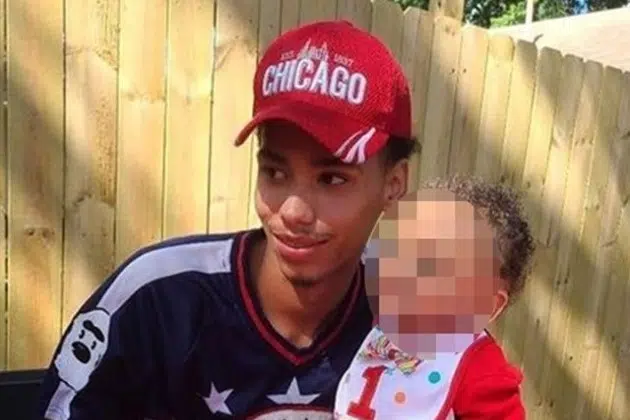BROOKLYN CENTER, Minn. (AP) — Daunte Wright’s family members joined with community leaders Thursday in calling for more serious charges against the white former police officer who fatally shot him, comparing her case to the murder charge brought against a Black officer who killed a white woman in nearby Minneapolis.
Former Brooklyn Center police Officer Kim Potter was charged with second-degree manslaughter in Sunday’s shooting of Wright, a 20-year-old Black man, during a traffic stop. The former police chief in Brooklyn Center, a majority nonwhite suburb, said Potter mistakenly fired her handgun when she meant to use her Taser. Both the chief and Potter resigned Tuesday.
Potter — who was released on $100,000 bond hours after her arrest Wednesday — appeared alongside her attorney, Earl Gray, at her initial appearance Thursday over Zoom, saying very little. Gray kept his camera on himself for most of the hearing, swiveling it just to show Potter only briefly. Her next court appearance was set for May 17. Hennepin County Judge Paul Scoggin reminded Potter that while out on bond she must remain lawful, make all court appearances and not possess or transport firearms or explosives.
Wright’s family members and protesters who have confronted police all week since his death say there’s no excuse for the shooting.
“Unfortunately, there’s never going to be justice for us,” Wright’s mother, Katie Wright, said Thursday. “Justice isn’t even a word to me. I do want accountability.”
Wright family attorney Ben Crump said “full accountability, to get equal justice” is all the family wants — “nothing more, nothing less.”
Crump and other advocates for Wright point to the 2017 case of Mohamed Noor. The Black former Minneapolis police officer fatally shot Justine Ruszczyk Damond, a white woman who was dual citizen of the U.S. and Australia, in the alley behind her home after she called 911 to report what she thought was a woman being assaulted.
Noor was convicted of third-degree murder in addition to second-degree manslaughter and sentenced to 12 1/2 years in prison. Potter’s charge carries a maximum 10-year prison sentence. Intent isn’t a necessarily component of either charge. A key difference is that third-degree murder requires someone to act with a “depraved mind,” a term that has been the subject of legal disputes, but includes an act eminently dangerous to others, performed without regard for human life.
Noor testified that he fired to protect his partner’s life after hearing a loud bang on the squad car and seeing a woman at his partner’s window raising her arm. Prosecutors criticized Noor for shooting without seeing a weapon or Damond’s hands.
Many critics of the police believe the race of those involved in the Wright shooting played a role in which charges were brought.
“If the officer was Black, perhaps even a minority man, and the victim was a young, white female affluent kid, the chief would have fired him immediately and the county prosecutor would have charged him with murder, without a doubt,” said Jaylani Hussein, executive director of the Minnesota chapter of the Council on American-Islamic Relations.
Potter could have easily been charged with third-degree murder, which carries a 25-year maximum sentence, said Rachel Moran, a law professor at the University of St. Thomas in St. Paul, Minnesota. But she noted that one difference between the Noor and Potter cases is that Potter will likely argue using the gun was a mistake, while Noor never said he didn’t intend to use his weapon.
“This is kind of the compromise charge, which isn’t to say it’s not serious. It is,” Moran said. “But they’re not reaching for the most serious charge they could theoretically file. They’re also not washing their hands and saying she has no criminal liability.”
Washington County Attorney Pete Orput did not return messages seeking comment.
Wright’s death came as the broader Minneapolis area awaits the outcome of the trial for Derek Chauvin, one of four officers charged in George Floyd’s death. Crump pointed to that trial as having the potential to set a precedent for “police officers being held accountable and sent to prison for killing Black people.”
Police say Wright was pulled over for expired tags, but they sought to arrest him after discovering he had an outstanding warrant. The warrant was for his failure to appear in court on charges that he fled from officers and possessed a gun without a permit during an encounter with Minneapolis police in June.
Potter, a 26-year veteran, was training another officer at the time.
Body camera video shows Wright struggling with police after they say they’re going to arrest him, before Potter pulls her gun. Potter is heard yelling “Taser!” three times before she fires and then says, “Holy (expletive), I shot him.”
Naisha Wright, Daunte Wright’s aunt, grew emotional at a news conference with other family members, saying, “Can we get a conviction? Can we get something? Manslaughter?”
She held up a photo of a Taser and then one of a handgun.
“But no, my nephew was killed with this — a Glock,” she said.
The criminal complaint noted that Potter holstered her handgun on the right side and her Taser on the left. To remove the Taser — which is yellow and has a black grip — Potter would have to use her left hand, the complaint said.
Experts say cases of officers mistakenly firing their gun instead of a Taser are rare, usually less than once a year nationwide.
Wright’s funeral will be April 22 at the New Salem Missionary Baptist Church in Minneapolis, his attorney said.
__________
(Copyright 2021 The Associated Press. All rights reserved. This material may not be published, broadcast, rewritten or redistributed.)
Latest News







